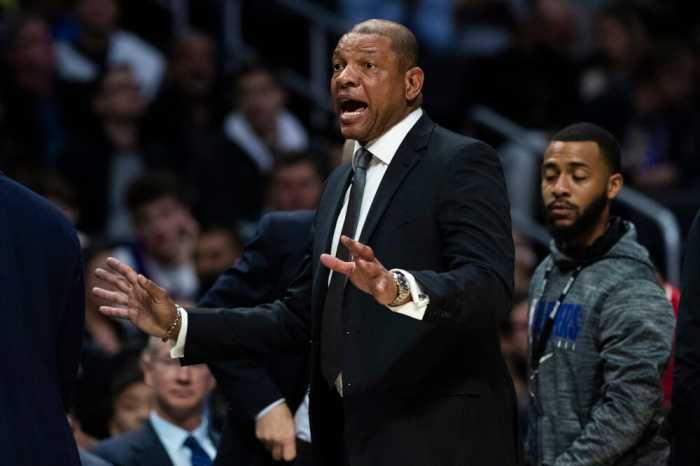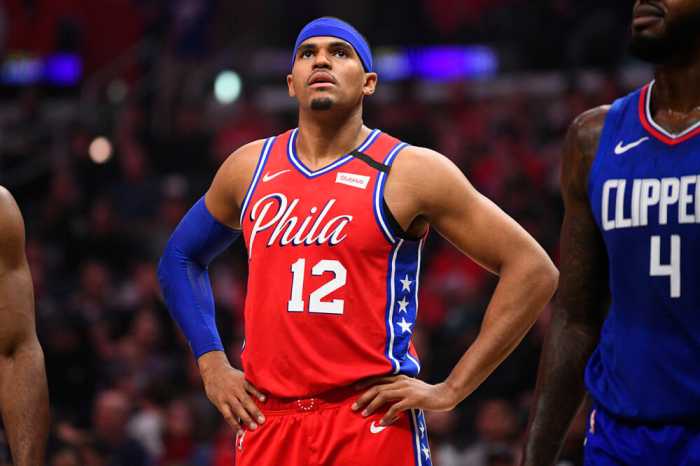Many are quick to claim that Sixers star Ben Simmons has regressed this season but is it possible that he’s actually evolved?
Every year Ben Simmons has played for the Philadelphia 76ers, he has changed his game to the needs of the 76ers roster. In his rookie year, he was needed on offense desperately and had one of the better years of his career on the offensive side of the ball.
Because of this, many think that the Philadelphia 76ers star point guard has regressed since his rookie season. After all, nearly all of his basic stats have gone down. 15.8 points per game down to 14.3 points per game. 8.2 assists per game down to 6.9 assists per game. 8.1 rebounds down to 7.2 rebounds per game.
However, the 2020-2021 76ers team had a total of 34.3 assists per game (the sum of all players assists per game), of which Ben Simmons had 6.9 of them. Looking at the 2017-2018 Sixers, they had 40.2 assists per game (using the same method), with Ben Simmons accounting for 8.2 of said assists.
Looking at these numbers, we can see that Ben Simmons accounted for just over 20% of the 2020-2021 Sixers team assists at 20.12%. In this 2020-2021 Sixers team, Tobias Harris was the next highest assist total at 3.5 assists per game, or 10.2%, nearly less than half of Ben Simmons’ numbers. Compared to his rookie year statistics and the numbers of the 2017-2018 Sixers team, Ben accounted for 8.2 assists per game, or 20.39%.
This must mean one of two things: Either this first seeded team is worse than the 2017-2018 team, or this 2020-2021 Sixers team is more talented and has more players who can score without having to be set up by others.
According to Basketball-Reference, in the 2020-2021 season, the Sixers percentage of two-pointers and three-pointers assisted on were 51.9% and 88.4%, respectively. Compare that to the 2017-2018 team, where assists were needed on 64.6% of two-pointers and 96.7% of three-pointers. That is a massive swing of 12.7% on two-pointers and 8.3% on threes.
These numbers show not only that Ben Simmons’ assists are nothing to worry about, but that Simmons’ lowering scoring numbers are a direct product of the diversified scoring effort on the Sixers and the roles that both Joel Embiid and Tobias Harris have fallen into for this team.
Looking into Simmons’ scoring itself, adding up every 2020-2021 sixers player’s points per game, and dividing that number by Simmons’ points, you get a percentage of 8.84%. Doing the same for the 2017-2018 Sixers and rookie Simmons, you get 9.11%.
While his percentage has decreased from his rookie season, so did the number of players scoring in double digits from seven to five. This is a sign of gaining star-caliber shot creators instead of a lot of role players reaping the rewards of a more offensively focused Ben Simmons.
Now that we have outlined Simmons’ offensive production and how it is not something that should be seen as regression let us not forget that we are talking about a player who was a Defensive Player of the Year Finalist.
A player who piled up 1.6 steals per game to go along with 0.6 blocks per game as the starting point guard. A player who was one of 9 defenders who allowed less than one point per shot, according to this graph from Kirk Goldsberry.
He is a 3-time All-Star, Rookie of the Year winner, 2-time All-Defensive 1st teamer, and Defensive Player of the Year Finalist, all by the age of 24. Ben Simmons has not regressed. He has evolved.






























